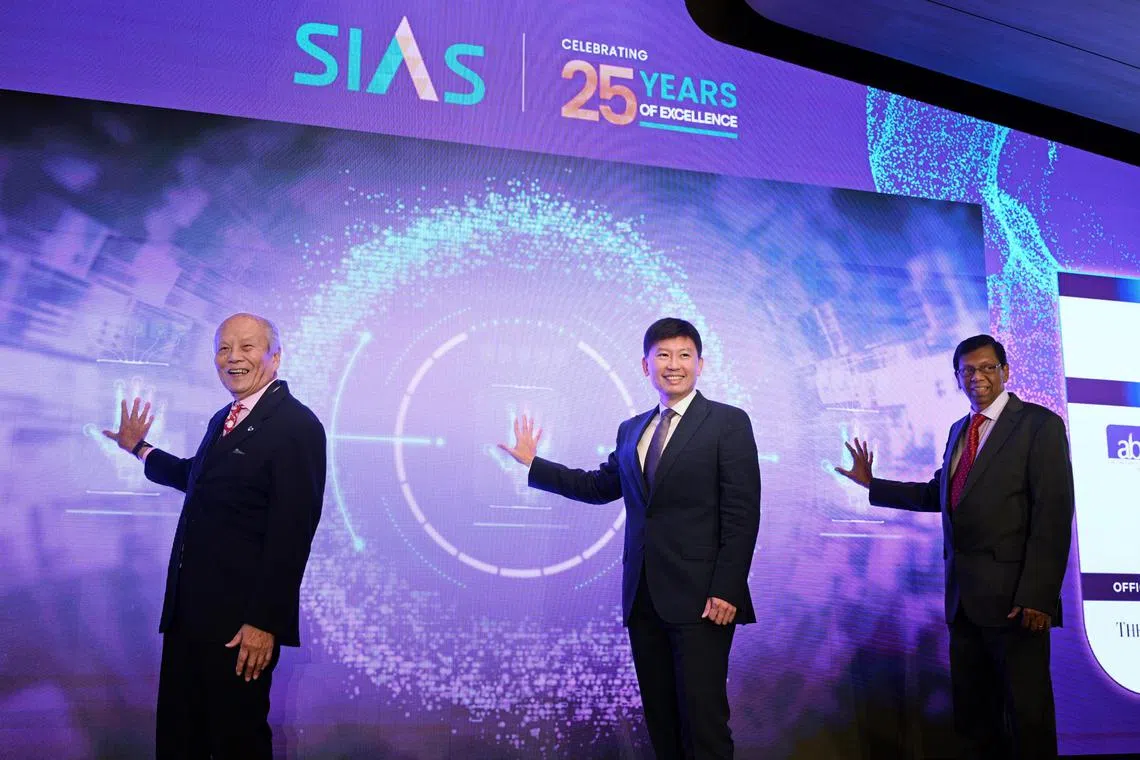Review group to focus on S’pore’s value proposition to investors, issuers to revive stock market
Sign up now: Get ST's newsletters delivered to your inbox

(From left) Sias' chairman Daniel Teo, Second Minister for Finance and MAS deputy chairman Chee Hong Tat and Sias chief executive David Gerald at the launch of the Sias Corporate Governance Week on Sept 16.
ST PHOTO: CHONG JUN LIANG
SINGAPORE - Having a pipeline of quality listings, enhancing investor participation and re-evaluating regulations are some ideas that resulted from a review group aiming to strengthen the equities market in Singapore.
In assessing its options, the group will also focus on Singapore’s strengths as well as its value proposition
The updates from the ongoing review were announced by group chair Chee Hong Tat on Sept 16 at the launch of a corporate governance event held by the Securities Investors Association (Singapore), or Sias.
Mr Chee, who is also Second Minister for Finance and deputy chairman of the Monetary Authority of Singapore (MAS), cautioned that it is not “an easy task” to revitalise the equities market, given the global headwinds faced by other exchanges and the rising competition in this space.
However, he noted that the review group is ready to step out of its comfort zone and take calculated risks to turn things around.
“Although we have identified some ideas from our engagements with industry stakeholders, it is not a given that all these measures will succeed. But we are prepared to make changes and try new ideas,” he said.
The equities market review group was set up by the MAS and it was announced by Mr Chee on Aug 2. Its objective is to develop an equities market that provides an attractive venue for local and regional enterprises to access funding and support for their innovation and expansion plans.
Mr Chee said: “A robust equities market provides a venue to facilitate successful initial public offering (IPO) exits – which allows private equity and venture capitalist investors to recycle capital into other start-ups and early-stage growth companies.
“This completes a virtuous cycle of growth, innovation and a more vibrant financial market.”
He added that the Government is considering policy measures and incentives to improve Singapore’s equities market and enterprise financing ecosystem. “These are important elements of our business ecosystem to support a competitive economy.”
New ideas put forth by the review group include encouraging a pipeline of quality listings, as Mr Chee noted that Singapore has a pool of over 4,500 tech start-ups, 400 venture capital firms as well as 240 incubators and accelerators.
Mr Chee added that the review may also target companies already based in Singapore and those from emerging markets in niche areas like fintech and innovation and sustainability to list here.
It will also look at incentives to encourage such listings, such as by lowering the costs of doing so.
“At the same time, due to the current venture capital funding winter, we have observed that more start-ups are listing before they are ready for the scrutiny of public markets. These companies are looking for alternative markets to maximise the valuation for their investors who are seeking exits,” Mr Chee noted.
“In this regard, we are reviewing how we can work with investors and fund managers to catalyse the secondary private fund sector to better support and nurture such late-stage start-ups in our ecosystem, as they grow and consider an IPO in the future.”
The review group will also explore more research coverage of targeted sectors before and after they go public, to help generate investor interest.
Another way to boost the equities market is to enhance investor participation and broaden market liquidity, Mr Chee said.
He noted that liquidity in the market here is concentrated in a limited number of well-known stocks. Around 85 per cent of the securities daily average value traded on the Singapore Exchange is attributed to the 30 large caps that make up the Straits Times Index, he said.
The review group can look at encouraging market makers to broaden stock indexes and expand the pool of equity market derivatives, among others, he noted.
Lastly, the review group can also re-evaluate regulatory structures, and “prune” regulations that may no longer be necessary, Mr Chee said.
He added: “There are important trade-offs which the review group and workstreams would need to discuss and assess – we are prepared to make bold changes but we want to do so after we carefully assess the trade-offs.”
For one, the disclosure requirements for the prospectus for IPO issuers can be streamlined to lighten the burden of compliance, he said.
MAS will also explore how some checks required for retail customers in more complex products can be removed.
But as the regulatory burden is eased to enable more investment options, Mr Chee cautioned that the industry and investors will need to do their due diligence checks, and exercise caution and judgment based on their risk appetites and preferences.
This is where Sias continues to play a key role to help retail investors gain tools and knowledge, he said.
Sias president and chief executive David Gerald said at the same event that investors have to do their homework and understand what they buy or sell, even in a world where artificial intelligence tools help them to trade quicker and more cheaply.
Mr Chee said the review group will also look into ways to strengthen the investor recourse framework, to better enable investors to seek redress in cases of market misconduct.
He noted that the group does not intend to wait till the end of 12 months before it implements the proposals, but that the measures will be rolled out in phases depending on their feasibility and if they require further review.



